EBoard Nominations
PRESIDENT-ELECT
(select 1 from the 2 candidates listed)
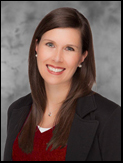 Amy Athey, PsyD, CC-AASP, University of Arizona
Amy Athey, PsyD, CC-AASP, University of Arizona
Bio: I am truly grateful and humbled to be considered for President-Elect. I have been an active member in AASP since joining in 2001. Along this journey, I have presented workshops and continuing education sessions with respected mentors and colleagues. Further, I served on the Certification Committee and then the Certification Appeals Committee. It was during this time where I began to recognize the significant challenges in credentialing through a portfolio review. So, when the call for volunteers was place to be considered as a Subject Matter Expert for the Job Task Analysis, I was excited to be involved. As I mentioned during the 2015 Business Meeting, participating in the Job Task Analysis was one of the most rewarding professional experiences I have had to date. Indeed, I am most optimistic to help continue the efforts in building this accredited credential!
In 2001, I was fortunate to find the ideal blend of my personal and professional interests when I first attended a national AASP conference and became a member. I went on to graduate with a doctoral degree in Clinical Psychology from Loyola College in Maryland and pursued continued educational and supervised training experiences in building competency in sport and performance psychology. Over the past 15 years, I have taught graduate and undergraduate sport psychology courses in the Department of Kinesiology at Mississippi State University and currently teach online for National University. I welcome opportunities to conduct research projects; for example, Dr. Michael Grandner and I were recently awarded a NCAA Research and Innovation Grant examining the impact of sleep on the mental well being and performance in NCAA Division I student-athletes. Yet, my full time positions have always rested in the practice of sport psychology. After making my way across the NCAA Division I conferences, I am currently the Director of Clinical and Sport Psychology Services for the University of Arizona Department of Athletics. I also provide consultative services for developmental and elite/professional performers in a small private practice.
Candidate Statement: Four years ago, I was over it. Not us, just “it.” You see, I came to cherish the many AASP colleagues who became good friends, and I showed up each year to see them. Yet, I was over “it.” I wasn’t sure if we were ever going to overcome the snowball of AASP struggles to see growth for our profession. And, here I am four years later, ready to serve with more hope than ever that we are moving forward in a meaningful way.
Over the past three years, I have gained renewed excitement for AASP and the sport psychology profession given the leadership investment and efforts to engage our members and grow external opportunities. Several years ago, I recall Dr. Jack Watson sharing his wife’s challenge to him during his 2013 Presidential Address. He related that after reflecting with her on whether he should run for President-Elect, she looked at him and said, “Do something about it or stop bitching!” Indeed, the idea of stepping up to help tackle our professional and organizational challenges in lieu of complaining still sits in the back of my mind. We have tremendous opportunity ahead and partnered with the recently developed Strategic Plan, I am optimistic that we will strengthen our membership and become an indispensible asset in our communities!
As I mentioned in my background statement, the stronghold of my AASP involvement, beyond presenting, has related to certification. While we have made significant strides with the completion of the Job Task Analysis and independent credentialing board development, we still have significant work to be completed. Knowing previous leaders’ investment in this pursuit, I am committed to seeing this process through to the accreditation process, and the certification becoming a globally recognized credential for sport psychology practioners.
The certification credential process also furthers our opportunity to build a framework for graduate training standards. Like many colleagues, I frequently receive emails from students interested in the field of sport psychology. Over the years, I have drafted an informative email response to hopefully guide them to potential training paths depending on their skills, strengths, and professional interests. And, indeed, how cumbersome that email has become! I can relate to the training paths confusion as I came from a clinical psychology program and then had to piece together additional post-doctorate classes in sport science. Fortunately, AASP was a place where I found mentors from various backgrounds to help expand my competency. Yet, I believe we can do better for the next generation of students! It is my desire to help further the development of graduate program recognition that offer the education and training experiences leading to AASP Certification.
We have many members today who have tackled their degrees and are looking for opportunities to give back to the academic, research, and applied communities. The recent development of the Strategic Alliances Liaison position has enhanced AASP’s targeted messaging and created strategic relationships to promote employment opportunities. The recent student survey, as noted in the Spring 2016 Newsletter, shared that after graduation, AASP student members reported a desire to implement their work in a number of settings (89% performance consulting, 64% research, 32-49% teaching (psychology/kinesiology), 20% military). Critical partnerships with other professional organizations are key to continuing to expand opportunities for each of these interests. With AASP’s strategic focus on building these relationships and aligning with our colleagues in the human performance industry, I am hopeful that we will see more sport psychology professional opportunities.
And, yet, we cannot simply focus on the development of practioner-model positions. The strength in my practice comes from the development and application of research from many specialty areas. I am invested in engaging and collaborating efforts of applied researchers and practioners to build a more robust understanding of human performance phenomenon. Opportunities for cross-programming and funding information dissemination have been identified in the strategic plan. Yet, my hope is this will be a jumping off point of additional collaborations in the future.
Lastly, I leave you with my vision – my vision is to continue building on the foundation that has been laid and challenge us to move with any hurdles and opportunities ahead. I will engage internally to build on collaborative relationships and focused efforts towards a globally recognized certification and graduate training standards. Further, I am excited to continue the momentum externally as we are aligning with other professional organizations and developing opportunities. Indeed, though, this is a “together” deal. If given the opportunity, I am excited to consider all that WE can become as we are long past “it.”

Amy Baltzell, EdD, CC-AASP, Boston University
Bio: Amy Baltzell is a Clinical Associate Professor and Director of the Sport Psychology Specialization (of Counseling) at Boston University. She has worked with professional athletes and aspiring Olympians in track & field, boxing, fencing, shooting, baseball, squash, rowing, and many other sports. She has been an invited speaker to a range of sites including professional basketball, professional baseball, collegiate coaches, US Rowing annual conferences and served as a Keynote for the Swedish Sport Psychology conference, the Lincoln School Positive Psychology conference, and for AASP Northeast Regional Conferences (Springfield, 2016; Temple, 2013). She has appeared on NBC Sunday morning news, the BBC, Greater Boston, and Fox news.
Amy is the author of Living in the Sweet Spot: Preparing for Performance in Sport and Life (FIT, 2011) and editor of Mindfulness and Performance with Cambridge University Press (2016). Her research focus is on mindfulness and self-compassion in sport. Specifically she is studying the impact of Mindfulness Meditation Training in Sport, an intervention designed to help athletes improve concentration, adapt while competing and increase their tolerance of distracting thoughts and emotions.
Amy received her bachelors from Wesleyan University (CT) and earned a masters and doctorate from Boston University. She is a former US National (1989, 1990) and Olympic (1992) Rowing Team member, member of the All women’s America’s cup Sailing Team (1995), and Head Varsity lightweight rowing coach (1998-1999) at Harvard University. She taught the first course in Sport Psychology at Harvard University.
Amy has been an AASP member for approximately 12 years, and her AASP committee & leadership involvement has included the Graduate Program Committee (2013-present), Ethics Committee Member (2007-2011), and the Distinguished Student Practice Award Committee (2008-2012).
Candidate Statement: AASP is a powerful organization, the leader in the worldwide advancement of the theory, empirical study and practice of sport, performance and exercise psychology. We need to wisely consider the main issues that will help sustain and amplify excellence in our organization. We are called to meaningfully contribute to performance and human thriving in a way that could also positively impact our society.
I am impressed and energized by our Strategic Plan. Leaders and engaged members of AASP have made extraordinary effort at both envisioning and taking action on creating an association that is desirable, fruitful, and excellent, an organization that meets our needs (and wants) as well as our clients, consumers and employers. Some main ideas from the Strategic Plan that I would like to support, if elected include:
- Make the annual AASP convention more compelling (e.g., offer broader innovative content)
- Help create employment opportunities for Sport Psychology practitioners
- Explore what AASP members hope to gain from being part of the organization and, in turn, meet these needs when possible (e.g., providing private practice templates/forms)
- Continue to upgrade the credentialing of AASP Certified Consultants so that our AASP CC is highly valued both by the consumer/employer and by the AASP CCs themselves (e.g., address supervision requirements; globalized certification)
- Improve the quality and focus of AASP publications (e.g., special issues in JASP & JSPA based on the interest of AASP membership)
- Support research and practice (e.g., webinars for cutting-edge research and practice)
- Continue to improve AASP, as a dynamic, compelling organization – one in which members want to engage, serve and volunteer.
If elected AASP President-Elect, I would prioritize these aspirations and related goals of AASP’s Strategic Plan. It is important to briefly share my background, given it influences my thinking – in my current teaching, research and practice. I was both an Olympic athlete (rowing) and professional athlete (America’s Cup sailing). For the past decade I have lead the graduate program at Boston University in Sport Psychology and am a practicing sport psychologist. My strong interest is helping athletes thrive under pressure. My books, Living in the Sweet Spot (2011) and, more recently, Mindfulness & Performance (2016) reflect these aspirations. My primary role in my role as professor is to educate and mentor some of the next generation of applied practitioners. I believe it is critically important to maintain a “beginner’s mind”, we need to be open and present to the needs of both our current and future AASP membership. AASP leads the way in what is mainstream in the theory, research and practice of sport (performance) psychology. Because of the power that our organization has in influencing all of us, as AASP president, I would also keep the following in mind and act when possible:
- Expand and promote theoretical approaches that could influence the sort of education and interventions we offer in sport (performance) & exercise psychology. For example, we have underutilized frameworks in the broader field of psychology (such as distress tolerance and mindfulness) that might contribute to the list of mainstay approaches and practice of sport psychology.
- Create an environment of inclusion at our AASP annual convention, in our AASP publications and in our media presence. We need to support AASP in being a safe and welcoming place for all – including historically under-represented and disenfranchised groups. In addition, I would like to support AASP serving those engaged in research and service beyond professional, big-time and elite sport.
- Support the development, research and dissemination of innovative approaches that will best serve the 21st century performer from athlete, dancer, musician to solider.
- Emphasize the importance of cultural and diversity factors in research, performance enhancement and exercise engagement. For example, we could do much more in our communities to promote sport systems that are socially just and more accessible, affordable and equitable. Universities and consultants have great tools to enhance and advocate for socially vulnerable populations along with their work within the elite domain of sport.
I am grateful for all that I have learned and experienced as a sport psychology practitioner, scholar and professor. If I become AASP President-Elect, I would look forward to working closely with and be advised by the AASP E-Board and other AASP leaders. I would commit to helping make wise decisions and support the next steps to strengthen AASP. With AASP serving as the leader in the field of sport (performance) and exercise psychology, I would like to help contribute to human thriving via supporting AASP as a known, respected, valued organization.
PUBLICATIONS/INFORMATION DIVISION HEAD
(select 1 from the 2 candidates listed)
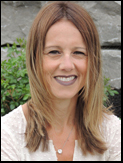 Natalie Durand-Bush, PhD, University of Ottawa - Canada
Natalie Durand-Bush, PhD, University of Ottawa - Canada
Bio: Natalie Durand-Bush, Ph.D. is an associate professor in the School of Human Kinetics at the University of Ottawa in Ottawa, Canada and an adjunct professor in the Norwegian School of Sport Sciences in Oslo, Norway. Through her research, she aims to understand self-regulatory processes and attributes underlying the development of optimal performance and well-being in different contexts including sport, medicine, the performing arts, and academia. Dr. Durand-Bush also investigates self-regulation interventions designed to help individuals and teams achieve performance excellence and sustain adequate mental health. Her consulting work with hundreds of high performance and developmental level athletes and coaches in the last two decades are an asset to her scholarly work and teaching. Dr. Durand-Bush is the co-author of the Ottawa Mental Skills Assessment Tool (OMSAT-3*©), an instrument developed to evaluate several mental skills necessary for consistent high quality performance. She was the Chair of the Canadian Sport Psychology Association and the Vice-President of the International Society of Sport Psychology from 2005 to 2009. She served as Assistant Director of Undergraduate Studies and Student Affairs in the School of Human Kinetics at the University of Ottawa from 2011 to 2014. She has delivered 139 presentations at national and international conferences, 24 of which were invited contributions. She has also published 39 articles in refereed journals, 14 papers in refereed conference proceedings, 7 refereed book chapters, 3 articles in professional journals, as well as her own lifeskills workbook.
Candidate Statement: I am thrilled and appreciative to have been selected to run for the Publications/Information Division Head E-Board position. Over the past 20 years, I have served academic and non-academic communities in many capacities and have gained knowledge, experience, and skills that would enable me to successfully fulfill this position. I have established a strong mixed methods research program at the University of Ottawa aimed at understanding self-regulation in sport, academia, medicine, and the performing arts. I have an excellent publication record and have served as an external reviewer for funding agencies, scientific journals, and the AASP conference abstract review process. As a result, I have an appreciation and respect for different types of research paradigms and methodologies that could make a significant contribution to AASP's three journals and newsletter.
I have read AASP's 2016-2108 Strategic Plan and specific Publications/Communications objectives. With sound evaluation, supervision, communication, and resourcefulness skills, I believe I could successfully fulfill these objectives aimed at improving the quality of operations and output of AASP publications and communications. If elected, I would focus on maximizing the competitiveness and reputation of the two established journals and ensure that the new Case Studies journal has a remarkable start. This would be accomplished by conducting a yearly evaluation of the composition of articles, publishing invited author pieces, preparing special journal issues, and developing comprehensive guidelines for journal reviewers. Given that three new journal editors were recently hired, and two new newsletter associate editors begin their term in June, a priority would be to provide them with adequate social and financial support and resources to successfully complete their mandate. With their collaboration, I would like to poll the AASP membership about ways that the journals and newsletter could best meet evolving needs and interests (e.g., submission criteria, topics for special issues, expansion of targeted audiences, increase of impact factor), as this has not been done in recent years. This survey would provide a valuable opportunity to work with the AASP Web Presence Committee to gain insight into how web-related activities may be better coordinated for members and the public.
I have contributed to AASP as well as other local, national, and international organizations throughout my career, which has allowed me to develop key collaboration, leadership, and managerial competencies. For example, the tasks I performed and the relationships I developed as a member of the Managing Council and Vice-President of the International Society of Sport Psychology in the course of 8 years, and as the Chair and Treasurer of the Canadian Sport Psychology Association for the past 10 years, would be extremely valuable in my work as Publications/Information Division Head. My involvement with AASP during the past two decades would equally serve me well. As a former AASP regional student representative, I initiated the Eastern Canada Sport and Exercise Psychology Symposium (ECSEPS) in 1996, which has since been a successful annual forum for students and professors. I am currently the Chair of the AASP Graduate Program Committee, a member of the AASP Dissertation Award Committee, and an Editorial Board Member for the Case Studies in Sport and Exercise Psychology journal. If elected, one of my aims would be to connect with prominent national and international organizations to recruit members with diverse expertise who could contribute to different AASP committees, journal editorial boards, and the newsletter, which is an important objective associated with this position. In addition, I would strive to increase publication in AASP's journals by scholars from developing countries by offering more support. For example, scholars requiring assistance with language could work with advanced graduate students interested in gaining more writing and publication experience. Also, as a result of calls for submissions from scholars in different parts of the world, I would endeavor to feature novel research findings and applied initiatives in the newsletter to expand its focus.
AASP prides itself on being an applied organization that continuously translates knowledge to the wider community and this type of practice has been the cornerstone of my research program and consulting work throughout my career. If elected, I would prioritize knowledge translation and work with members of my team and the Web Presence Committee to target creative ways to communicate with the AASP membership and beyond. For example, technology, social media, and the Newsletter are crucial resources in this process and their full potential may have not been maximized. With technology as a focus of some of my research, I would make every effort to help enhance publications and communications delivery channels using new technology/social media methods that extend beyond email, Facebook, and Twitter. In sum, I believe I can make an important contribution to the E-Board and to AASP in general, and I welcome with enthusiasm this opportunity to serve as Publications/Information Division Head.
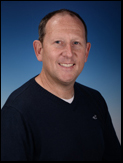 Gordon Bloom, PhD, McGill University - Canada
Gordon Bloom, PhD, McGill University - Canada
Bio: I obtained a PhD in Sport Psychology from the University of Ottawa in 1996. My first academic appointment was at California State University, Fresno, as an Assistant Professor in the Department of Kinesiology. Presently, I am an Associate Professor in the Department of Kinesiology & Physical Education at McGill University in Montreal, Canada and I am the Director of the McGill Sport Psychology Research Laboratory (http://sportpsych.mcgill.ca). Over the past 20 years, I have developed an internationally-recognized research program, which incorporates health-related educational objectives with particular focus on sport concussions, and coaching strategies, behaviors, and outcomes. I have worked on funded research projects totalling over $1,000,000, and I have published over 90 empirical articles and book chapters. The goal of my applied research program is to help athletes and coaches achieve personal development and performance success. In addition to my teaching and research responsibilities, I am a member of the managing council of the Canadian Sport Psychology Association. I have consulted with amateur, professional, Olympic, and Paralympic athletes and taught them how to use mental skills to accelerate their level of performance in sport and life. Additionally, I have worked with the United States Olympic Committee, Singapore Sport, the Nippon Sport Science University in Japan, and the KIHU research center in Olympic Sports in Finland. From a personal perspective, I still enjoy competing in ice hockey, ball hockey, tennis, and softball and coaching my children in ice hockey, baseball, or soccer.
Candidate Statement: I am delighted to have the opportunity to run for the position of Publications/Information Division Head, based on my long history and dedication to AASP (member consecutively since 1993), as well as my background as a scholar and practitioner. AASP has always been an important part of my professional growth and development and I look forward to gathering with friends and colleagues and meeting new ones every year at the annual conference. Throughout my career, I have co-authored 32 AASP research presentations, ranging from poster, to oral, to young professional panel, to the 5-minute coaching session this past year. I have worked with athletes from all levels of sport, from the amateur to professional to the Olympic and Paralympic levels. I have also supervised the applied practicum of many graduate students. I am employed by an institution that has a history of research excellence, as noted in its top 25 status in the QS World University ranking. Additionally, I have been on the JASP editorial board for over 10 years, as well as other journals including Qualitative Research in Sport, Exercise and Health, Journal of Sport Behavior, and International Sport Coaching Journal.
I believe in the importance of applying sport psychology research and theory to practice, with coaches and athletes. After reviewing the AASP mission statement, including the 2016-18 strategic plan, I feel that I can help the organization by bringing in new ideas based on my applied and academic experiences, as well as the other governance positions I have occupied at McGill University and with various sport organizations. I have presented my coaching and concussion research internationally where I have established friendships and partnerships with many leaders in sport psychology around the globe. I would like to strengthen our ties with applied and research associations around the world (e.g., Australia, Canada, and United Kingdom) to draw on their best practices, given that AASP is an international organization. I am interested in reviewing the policies, goals, and procedures of AASP’s three journals to determine how to improve their impact and reach and to continue to strengthen the theory to knowledge framework. I will examine our web-related initiatives to find ways to strengthen ways of disseminating new information on important topics. Further to this, I think AASP could be a leader in educating and informing other stakeholders who work with athletes, such as coaches and sport organizations, from the amateur to the elite levels. Additionally, I believe we could benefit parents by informing them of best practices.
In sum, I have energetically been involved in various department, faculty, and university committees to learn the administrative structure and processes. Additionally, I remain committed to service within the discipline of sport psychology through editorial services for reputable scientific and professional journals and organizations and through leadership of scientific and professional meetings. It is a combination of these experiences that have prepared me to run for the position of Publications/Information Division Head.
PROFESSIONAL STANDARDS DIVISION HEAD
(select 1 from the 2 candidates listed)
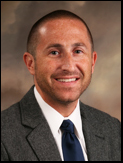 Brandonn Harris, PhD, CC-AASP, Georgia Southern University
Brandonn Harris, PhD, CC-AASP, Georgia Southern University
Bio: Brandonn S. Harris, Ph.D., CC-AASP is currently the Program Director and Associate Professor of Sport and Exercise Psychology at Georgia Southern University. He is a member of the Association for Applied Sport Psychology and Division 47 of the American Psychological Association. He is also a Certified Consultant with AASP and is listed on the United States Olympic Committee’s Mental Training Registry. During his 13 years as an AASP member, he has proudly served the organization in various capacities. His leadership and involvement in AASP began during his doctoral program as a member of the Youth Sport Special Interest Group. While maintaining his involvement in that group, he was asked to serve on the Ethics Committee beginning in 2009. In 2011, he was asked to Chair the Ethics Committee, in addition to serving as the Coordinator for the Youth Sport SIG. His term as Chair recently ended after four years of service. As a researcher, he conducts, publishes, and presents work in the areas of professional practice and ethical issues in sport psychology, youth sport, and athlete burnout. As a practitioner, he consults with youth and collegiate athletes, teams, parents, and coaches on a variety of sport psychology-related topics. He obtained his bachelor’s degree in Exercise Science with a sport psychology specialization from Truman State University in Kirksville, Missouri. He holds Master’s degrees in Sport and Exercise Psychology and Community Counseling from West Virginia University. His Ph.D. in Sport and Exercise Psychology was also completed at West Virginia University.
Candidate Statement: It is a tremendous privilege to be considered for AASP’s Professional Standards Division Head. With the recent completion of my term as Chair of our Ethics Committee for the past four years, I am excited and eager to continue working diligently on behalf of the members and organization I care so deeply about to advance our association and profession. As such, I believe my (1) previous experience, (2) vision for our organization, and (3) strong relationships with leaders and current members of our organization have substantially prepared me for the Professional Standards Division Head position.
Experience
First, as the Ethics Chair, I worked alongside several members of the AASP Executive Board and had an opportunity to develop policies and procedures allowing AASP to navigate critical challenges within the areas of ethics in professional practice and research, conference submission guidelines, and title use. I have also been fortunate to learn much about the inner-workings of the committees that this position oversees having had the chance to collaborate with the Conference Planning, Certification Review, and Ethics Committees. Through these experiences, I facilitated the development of Standard 26 of our organization’s Ethics Code regarding the ethical use of technology. I also collaborated with the Conference Planning Committee to establish comprehensive guidelines for the abstract submission process. Finally, I helped to navigate a series of ethics-related issues and inquiries on behalf of our organization. I understand the sensitive and important nature associated with the responsibilities of this position, particularly within the areas associated with our Ethics, Certification, and Diversity Committees, all of which falls within the oversight of this position. I am committed to supporting and overseeing each of these committees with great care and professionalism, thereby serving AASP as we further its status as the premiere organization in sport psychology regarding the training, education, and credentialing of our members.
Vision
Second, as the leading organization in our field, my vision for AASP includes establishing the standards for sport psychology in ethical and competent practice, training, and research. The efforts of AASP’s leadership, past and present, have served as a catalyst in facilitating these efforts; and, the opportunities to advance the progress already made is significant for the Professional Standards Division Head. Of particular relevance to this position are member training/development, job creation, and professional standards and certification of which AASP’s newly-established Strategic Plan serves as a guide for these efforts. I am prepared to facilitate the accomplishment of the goals identified within the plan, as well as to identify new and exciting opportunities to promote the AASP and the profession at large.
Regarding member training and job development, I foresee working closely with E-Board members and the Conference Planning Committee, examining conference formats and professional development opportunities available to members as it pertains to professional standards content. Additionally, we must continue to strengthen ties with other associations through an exchange program that promotes collaboration and employment opportunities. To this end, I envision the annual conference providing opportunities for onsite job and internship interviews by employers seeking qualified AASP student and professional members. Additionally, perhaps no aspect of the Strategic Plan involves this position more than its Professional Standards and Certification Initiative. A critical component to this involves the Job Task Analysis. As an association leader, I would be committed to furthering the efforts of those involved in the JTA’s Validation Report, and with the Certification and Continuing Education Committees, enhancing the credentialing process, examination, and marketing of the importance certification has to consumers. Through this process, and the work of the Coalition’s Legal Title Group, I believe our organization can also make headway regarding ethical and legal title use for our field. Additionally, with the work of the Coalition and AASP’s leadership, program recognition criteria could conceivably lead to a formalized accreditation process for graduate programs in our field. Within this position is also an opportunity to update our Ethics Code, particularly regarding multicultural competence. Addressing these details ensures we uphold the highest standards in our work, while communicating to the public our values regarding competent, ethical practice with multicultural sensitivity.
Strong, Working Relationships
Lastly, it is not without the time and effort of individuals voluntarily dedicating their time and resources that AASP currently sits as the premiere international organization and governing body in sport psychology. I would be remiss if I did not acknowledge the importance fit has among those members who are privileged with serving on this Board. My well established rapport and relationships with the current Board coalesce with my previous experiences and vision for the association, positioning me to serve AASP in an effective capacity. It would be an honor to work with this outstanding group of professionals and further our organization in a direction that continues to set the standard for our field in practice, training, and research.
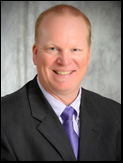 Bob Harmison, PhD, CC-AASP, James Madison University
Bob Harmison, PhD, CC-AASP, James Madison University
Bio: Robert (Bob) Harmison is the Kibler Professor of Sport Psychology in the Department of Graduate Psychology at James Madison University and the Director of Sport Psychology for JMU Athletics. In these roles he teaches, advises, and supervises doctoral and masters’ students with interests in applied sport psychology and provides sport psychology services to NCAA Division I student-athletes and coaches.
Bob has been an active member of AASP since 1993, was designated as a CC-AASP in 2002, and was elected to AASP Fellow status in 2015. He served on the Certification Review Committee from 2008-2014, including a three-year stint as the Committee Chair. From 2012-2016 he was appointed to the Future of Certification Ad-hoc Committee and was an active contributor within the Professional Standards/Certification workgroup for the 2016-2018 AASP Strategic Plan. Bob recently was selected to serve on the AASP Interim Certification Council, which has been charged to create policies for the new certification program and guide initial development of the certification exam.
Bob has provided sport psychology services to athletes and teams for over 20 years, most notably U.S. Snowboarding from 2000-2011, the 2002, 2006, and 2010 U.S. Olympic Snowboard teams, and the Kansas City Royals minor league organization in 2004. He has been a member of the USOC Sport Psychology Registry since 2002 and is a licensed psychologist (inactive) in the state of Arizona.
Bob received a Ph.D. in Counseling Psychology from the University of North Texas in 2000 and an M.S. in Exercise and Sport Sciences (Sport Psychology) from the University of Arizona in 1994.
Candidate Statement: The Professional Standards Division Head is a natural next step in the evolution of my professional service to AASP. I believe my experiences to date have prepared me well to be a leading voice for AASP as we aspire to set the standards for professional practice. If elected, I would focus our collective efforts in the following professional standards areas as identified in the 2016-2018 Strategic Plan:
Establishing a unifying core identity: Organizational identity has been defined as the central, distinctive, and enduring characteristic of an organization (Albert & Whetten, 1985). How would you describe our core identity as an organization? Who are we and what do we do? Are we sport consultants/psychologists, exercise consultants/psychologists, and/or performance consultants/psychologists? Do we practice sport psychology, exercise psychology, and/or performance psychology? I believe that one of the central, distinctive, and enduring characteristics of AASP as an organization is the lack of a professional practice core identity. Not surprisingly, defining a unifying core identity that states who we are as an organization and what we do in terms of professional practice was identified as one of the specific objectives in the current strategic plan. Certain steps already have been implemented (e.g., job task analysis), while other tasks, such as identifying core competencies for the practice of exercise psychology, have been planned. As the Professional Standards Division Head, I will work closely with the various committees charged with these tasks to achieve this objective over the next three years and establish a more unifying core identity regarding who we are and what we do as practicing professionals.
Strengthening the certification program: One of the most significant contributions to the profession made by AASP’s founding members was the creation of the certification program. The certification program established the minimum educational and experiential requirements needed to signify that practicing AASP professionals have met the highest standard of education and training in the psychological aspects of sport science. While the certification program has served AASP and its members well internally, it became increasingly clear over time that the certification program was not having the desired impact of enhancing the credibility of the industry nor promoting AASP members to the general public. Thus, strengthening the certification program was established as a goal in the previous strategic plan and continues to be a specific objective in the current strategic plan. I will maintain the efforts made over the past five years to strengthen the certification program, most notably supporting the move to competency-based certification standards and an exam-based certification. In addition, I will provide informed leadership as policies for certification are revised and created to facilitate the process of becoming certified without compromising our established standards. Doing so will surely enhance the value of being certified to the individual consultant, our consumers, and potential employers and position the CC-AASP credential to be formally recognized as an accredited certification program by the National Commission of Certifying Agencies.
Furthering the professionalization of the field: Concerns regarding the professionalization of our field were a foremost factor when AASP was formed. Over the past 30+ years, AASP has provided much needed guidance in promoting standardized training of professionals, establishing minimal competencies for entrance into the profession, and setting guidelines for ethical practice. My years on the Certification Review Committee and Ad-hoc Future of Certification Committee convinced me that opportunities exist for us to build on our past accomplishments and further the professionalization of our field. Specifically, ethical and cultural competence are central to effective practice. I will work closely with the Ethics Committee to achieve the strategic plan goal of revising ethics policies and procedures to better educate our members and address unethical behavior. I will support the efforts of the Diversity Committee to include diversity/cultural competence as a criterion for being designated as a CC-AASP. In addition, quality mentorship/supervision needs to be a cornerstone in the training of professionals, and I will endeavor to ensure that the strategic plan goal of determining the appropriate quantity and quality of mentored/supervised experiences for entry-level competency is met. Finally, continuing education of our practicing members is vital to the survival and growth of our field. I will work together with the Continuing Education Committee and Certification Review Committee to revise the current continuing education requirements for recertification and offer continuing education experiences to better reflect the competencies needed for effective practice and allow our members to stay more current.
I am honored and truly humbled to be nominated for the position of Professional Standards Division Head for the organization that has shaped my own professional identity and for which I have the most passion. If elected, I will do everything within my power to reflect the voice of the membership, and it is my sincerest hope that my term would honor those who have mentored me.
SCIENTIFIC PROGRAM DIVISION HEAD ELECT
(select 1 from the 2 candidates listed)
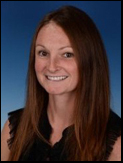 Angie Fifer, PhD, CC-AASP, United States Military Academy
Angie Fifer, PhD, CC-AASP, United States Military Academy
Bio: Angie is a Performance Enhancement Trainer in the Center for Enhanced Performance (CEP) at the United States Military Academy at West Point. Angie provides performance excellence training to numerous Division I and nationally competitive club teams and individuals, along with cadets working on Army physical fitness standards, courses, and military requirements. Angie also works with the Army West Point team captains providing monthly discussion sessions and assisting on a yearly leadership development retreat. Additionally Angie works with youth, college, and professional athletes outside of West Point. Angie earned a B.S. in Kinesiology and Psychology from Penn State University, her M.S. in Sport and Exercise Psychology from California State University at Fullerton, and a Ph.D. in Sport and Exercise Psychology from Michigan State University. Angie studied recreational female marathoners and how they find meaning in their running for her dissertation research. Angie has worked with a variety of coaches, teams, and individual athletes guiding their mental game development as they strive for excellence in their performance domain at Michigan State and then as a post-doctoral intern at the University of Georgia. She has been an AASP member since 2002 and a Certified Consultant since 2010. Angie is an avid distance runner and two-time Ironman triathlon finisher.
Candidate Statement: One of my most anticipated weeks each year is the annual AASP conference, during which I reconnect with former colleagues, mentors, and mentees involved in the amazing field of Sport Psychology. The conference program often drives who comes or does not come to this yearly re-energization. I would be humbled to have the opportunity to take a leadership role in coordinating, organizing, and selecting our conference program content. I believe we can continue to meet the needs of our incredibly diverse membership to create a program that encourages former, current, and new individuals to participate in both presenting and attending our conference to advance and promote the field we all are passionate about.
I am incredibly passionate about AASP as an organization and how our conference brings members from Sport Psychology and a litany of related fields together to share cutting edge research and best professional practices. Our breadth and ability to cross-pollinate with other fields is a tremendous strength that has been and can continue to be showcased in our conference program. One concern expressed in the past years business meeting was the conference representing all areas of sport, exercise, and health psychology. In collaboration with the past Scientific Program Chair, I would like to encourage members across all subsets of the field to submit abstracts and provide suggestions of keynote speakers that will enhance their work. As an association leader I want to listen to our members through membership surveys, committee recommendations, and open membership meetings to build upon the guidelines of the new Strategic Plan. I understand this is a massive undertaking and that it is impossible to make every member happy. With the help of the new conference planning committee, we will do our best to meet the needs and requests of our members.
The conference program of recent years has been exceptional, but there is always room to encourage continued growth. As chair my main focus would be to increase the representation of research and practice presentations across all areas of the field. I want to encourage committee chairs, special interest groups, and department chairs to submit and have their students submit. I would also like to review the Regional conference programs to understand what students are presenting on and encourage them to submit. As we work to revamp our abstract categories, potentially including a student research and practice session would add a greater representation across all areas of the field.
Leading a team is a role I not only teach but also put into practice. The addition of conference committee planning members will play a crucial role in strengthening our breadth across our program content. I am confident I can lead this team through my previous experiences as a committee chair for the Student Development Committee and my current role as the Intern Supervisor at the Center for Enhanced Performance. As a supervisor I first want to empower my team to be proactive and inquisitive. By building a positive relationship together we will be able to challenge one another and ultimately be as inclusive as possible in our product. Communication, preparation, and efficiency will encourage our team to commit to our tasks while also respecting everyone’s daily work and life responsibilities.
Finally, I want to help our membership to remember what AASP is all about. Passionate scientists, practitioners, and students getting together to sharing experiences to help each other, our field, and our consumers to be the best they can be.
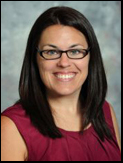 Melissa Thompson, PhD, CC-AASP, University of Southern Mississippi
Melissa Thompson, PhD, CC-AASP, University of Southern Mississippi
Bio: Melissa Thompson, Ph.D. is an Associate Professor in the School of Kinesiology at the University of Southern Mississippi. She holds a doctorate in Educational Psychology with an emphasis in Sport and Exercise Psychology from Florida State University and a Master’s of Science with an emphasis in Sport Psychology from Georgia Southern University.
As demonstrated through a series of peer-reviewed publications and presentations, her primary area of research relates to Coach Development through formal and informal settings with a specific interest in the development of coaching ethics and decision-making. Her teaching responsibilities include both undergraduate and graduate courses in sport psychology, advanced coaching methodology, the psychology of exercise, and learning theories in sport pedagogy.
She is a Certified Consultant through the Association of Applied Sport Psychology and has been since 2009. Dr. Thompson has continued to engage in consulting opportunities in her community and region through Arete Sport Consulting, her personal business. She has previously served AASP as a member of the Student Practice Awards committee, as an abstract reviewer for the annual conference, and on the Coaching SIG. Outside of AASP, she is currently on the Editorial Board for Case Studies in Sport and Exercise Psychology, has served SHAPE America as a member of the Sport Steering Committee (2012-2015), and as a member of the NCACE advisory committee.
Candidate Statement: I believe the Scientific Program Division Head is an incredibly important responsibility. For many members, the annual conference is the one opportunity to connect with other members of the Sport Psychology community to discuss the latest developments in research and practice. The impact of that experience is only as strong as the quality of the scientific program. I have greatly benefited from my attendance at 11 of the past 12 AASP conferences and would like an opportunity to pay that forward through service on the e-board in this capacity.
Early in my career, one of my mentors stressed the importance of supporting the AASP movement. He clarified that, at that point, the credential might not mean much but that for the good of the profession as a whole, it was critical that we pursue CC status. I have thought a lot about his words in the past 12 years. While I actually believe my credential has benefitted me in numerous ways, it is the sentiment about the growth of our profession that resonates with me the most. Sport Psychology is a stand-alone discipline that operates at this multi-way intersection of human psychology, physiology, counseling, motor behavior, and competitive or performance situations. While not everyone has expertise in all of those areas, one who is only an expert in one of those areas might find it challenging to work with in the performance domain. I envision AASP as the leading organization in the charge to spread the most innovative and evidence-based information in this unique space. In fact, AASP is in a position to become the go-to organization for the dissemination of information that falls under the umbrella of Sport Psychology. In order to do that effectively, AASP must have a strong and engaging annual conference that welcomes both members and those interested in learning more about the discipline and how it applies to their work. Further, the conference should simply be the first stop for idea sharing with much of the information presented at the conference then being translated into materials useful for the general population.
Implementing progressive conference models is one approach to increase the engagement and usefulness of conference attendance. The introduction of the 5 in 5 sessions to the program in the last two years is a prime example of one way to use different program models to increase the engagement of the members while still disseminating quality information to attendees. Using extended sessions, like master classes where attendees register for sessions and do some pre-session preparation, is a potential avenue to engage the long-time members in continued development. That structure allows them to engage on a deeper level than is sometimes possible in the typical conference session. I see that as an important group to consider because it seems that attendance at the annual conference tends to drop-off after a few years. Another option might be to host a members only day at the beginning or end of the conference that might employ a solutions-based approach to moving the profession forward. In these types of settings, members are engaged in interactive and lively discussions and idea-sharing that often result in a strong plan of action. These ideas are just a few that might be explored when thinking about the overall conference program and how to use the conference as the gateway to knowledge-sharing within the discipline.
STUDENT REPRESENTATIVE
(select 1 from the 2 candidates listed)
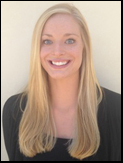 Joanna Foss, MA, University of Missouri
Joanna Foss, MA, University of Missouri
Bio: Joanna Foss is a doctoral student in Counseling Psychology with a subspecialty in Sport Psychology at the University of Missouri. Joanna was first exposed to sport psychology through an internship in the Center for Enhanced Performance at West Point during her undergraduate training, and she has been immersed in the field ever since. Joanna is currently in her second year as an AASP Student Delegate. She is Chair of the Graduate Program Fair Initiative and Co-Chair of the Performance Excellence Movement Initiative (PEM). Additionally, she has served as a mentor for the Mentorship Match Program and is a member of the Research Development Committee. Joanna also received the 2014 AASP Student Diversity Award for her work with Latino youth from lower socioeconomic strata. While pursuing her Master’s degree in Sport and Performance Psychology from the University of Denver, Joanna co-designed and implemented a sustainable comprehensive performance psychology program including service provision to all teams, parent and coaching education, and leadership sessions with team captains.
Joanna has sought balance between performance enhancement, counseling, and research throughout her doctoral training. She currently works as a Mental Performance Coach in the University of Missouri Athletic Department, delivering individual and group performance enhancement services to athletes and coaches. Joanna has also increased competency in counseling through practicum experiences in college counseling centers and in research skills through work in her advisor’s research lab. Joanna received her Bachelor’s degree in Psychology from Marist College, where she competed as a four-year starter on the Volleyball team.
Candidate Statement: I am grateful and honored for the nomination to run for the position of AASP Student Representative. I have been a member of AASP for the past 4 years and have found many opportunities for both personal and professional growth through AASP. Students represent the future of our field, and ensuring the best possible experience within AASP advances our organization and the direction of the field as a whole.
AASP’s commitment to students’ professional development is clear within the 2016-18 Strategic Plan. In alignment with the Strategic Plan, supporting and extending student professional development opportunity is an area on which I would focus during my term. As a Student Delegate, I have worked to improve the student experience with the Graduate Program Fair, including an orientation session at the upcoming annual conference to provide students information about types of training programs. Furthermore, I have helped expand the PEM student magazine from one annual issue to two issues, providing students further opportunities to practice writing skills and to increase content dissemination. As a Student Representative, I would continue to focus on increasing professional development opportunities and content for students, with a priority placed on conference programming such as panel discussions on developing a private practice and workshops on generating new clientele. To address the desire to gain skills and content knowledge highlighted in the recent student membership survey, I would make content generation in the Best Practices in Research and Best Practices in Consulting Initiatives a priority through increased website materials and webinars focused on evidence-based practice in both research and consulting.
As a Student Representative, I would also seek to increase a sense of community among students across degree programs. One element of being a Student Delegate that has been incredibly meaningful for me has been connecting with other students and developing new professional and personal relationships. I strongly believe that networking across programs and across content areas is vital for expanding our knowledge and creating an integrated view of performance. The conference is a natural place for this to occur, so I would support and expand opportunities at the conference like the Student Social and student programming. Beyond the conference, increasing social media presence through the Website and Social Media Initiative would increase connections among students both nationally and internationally. Furthermore, I would propose a new “Peer Connections” Initiative, connecting students of similar levels of training via video conference or phone call to build relationships and to discuss various takes on topical content. Rather than connecting people in pairs, the focus would be on networking with multiple people and creating an atmosphere of group support.
I am strongly committed to the professional development of students and to ensuring the best possible experience within AASP through strong community ties. I feel very hopeful and optimistic about the direction of AASP, and I would love the opportunity to serve the organization as a Student Representative to assist students moving into the future with confidence. I appreciate your consideration for the position.
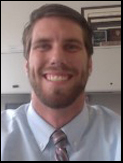 Davis VanderVeen, MA, IUPUI
Davis VanderVeen, MA, IUPUI
Bio: I am a fourth year doctoral candidate in the Clinical Psychology Ph.D. program (health psychology concentration) at Indiana University – Purdue University, Indianapolis (IUPUI). My interest in sport psychology originates from my academic and personal interests: I played varsity tennis for four years and was elected team captain at Hope College in Holland, MI. I graduated in 2013 with a B.A. in Psychology and Neuroscience. I came to Indianapolis for a degree in clinical psychology because of the strong research driven approach to clinical work as well as the breadth of clinical training opportunities. I received my M.S. in Clinical Psychology in 2015. To date, my research has focused on individual personality and emotion differences in behaviors such as alcohol use, marijuana use, and sports performance. My career goals are to design and provide treatment to people across the spectrum of mental health- from alleviating mental disorders to enhancing optimal life functioning. In addition to my educational training, I have continued to pursue my career goals by being actively involved in AASP as a student delegate with the creation of the Best Practice for Research (BPR) initiative as well as attending the local and national conferences. I believe the experiences I have had equip me with a unique perspective to contribute as Student Representative, and this position will further my development to help me achieve my career goals.
Candidate Statement: Students are drawn to AASP because of the strong network of professionals in the field. AASP offers great opportunities for students to develop their professional network with local conferences, approachable expert panels, and more personal lunches at the national conference. Such opportunities allow students to learn more about the field and begin to build a network. Workshops throughout the year allow more hands on skill development. In my conversations with both professionals and other fellow students, a few growth areas have come to light: job opportunities and requirements to practice sport psychology. I feel it is important for AASP to focus efforts in these areas to further enhance the excellent opportunities available to students.
Students begin studying sport psychology because it is often a combination of many of their academic and personal interests. However, these interests often do not lead to a very clear career path. I think students believe that their career prospects are either to work in academia conducting research or go into practice. While there are certainly other career options (e.g., coaching, program development, etc.) these alternatives are not very clear to students. I believe one of the reasons for this is uncertainty regarding the requisite educational and training requirements for sport psychologists.
AASP has made a concerted effort to establish requirements to obtain certified consultant status. Despite having these guidelines, students still feel a disparity within AASP about what makes a sport psychologist and what types of jobs they would be qualified for given if they have achieved CC-AASP. This has been a highly debated topic at both local and national conferences, as well as on email listservs. Students have heard the sport psychologists must have a clinical or counseling psychology degree but have also heard a sport psychology or kinesiology degree is sufficient to do most practice but cannot call themselves a psychologist. I believe AASP student members would benefit greatly with clearer guidelines about what professional activities CC-AASP status allows them to do. While this is certainly not an easy task, I believe concentrating efforts to resolve this could lead to more students having confidence in their career path as well as a more unified AASP professional network.
In conclusion, I feel that students will benefit from clearer training guidelines as well as a better understanding of career options in sport psychology. By concentrating efforts into these areas, students will value AASP membership more. I believe I would be a good fit for the position of student representative because I am able to communicate the student members’ perspective to the executive board, and work with the executive board to enhance the value of AASP for both students and professionals.



